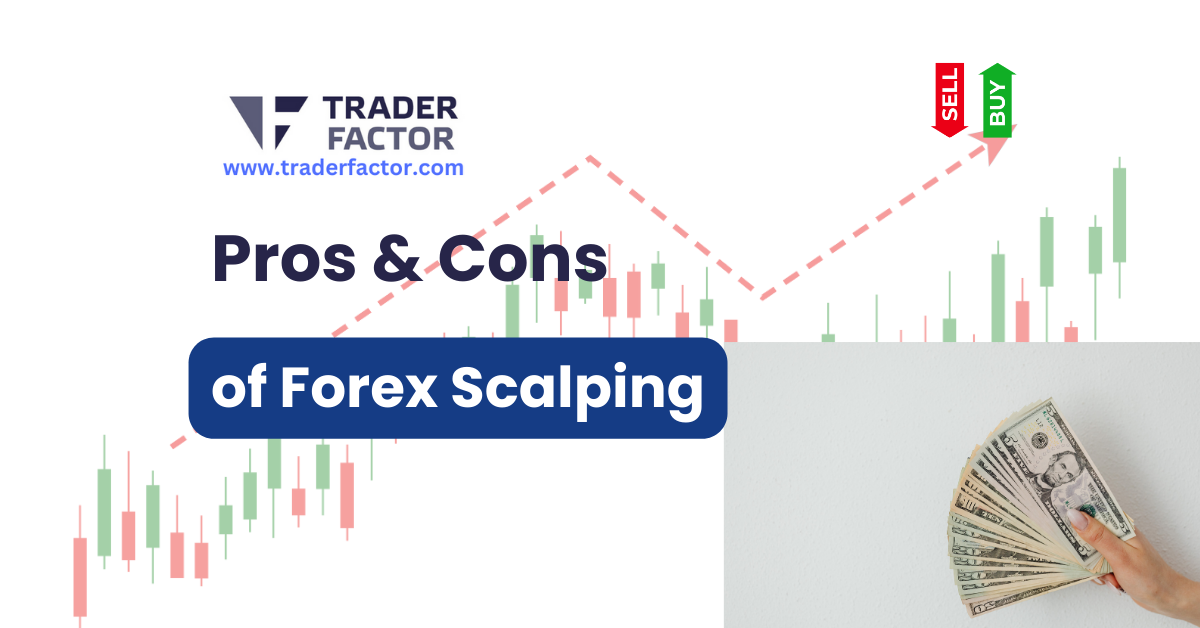Forex scalping is a rapid-fire trading strategy where traders dive in and out of the market, seeking to capture small price movements. This technique, known for its potential to yield quick profits, demands a keen eye for detail and swift decision-making. While the allure of rapid gains is enticing, forex scalping also presents challenges such as high transaction costs and emotional stress. Traders must be able to navigate the fast-paced environment, balancing the benefits of discipline and skill enhancement against the risks of frequent trades. Dive into this dynamic world to weigh the pros and cons of forex scalping.
Understanding Forex Scalping
To truly understand forex scalping, it’s essential to recognize that it’s a trading style heavily reliant on making numerous quick transactions to profit from small market price changes. As a scalper, you need to be always on your toes, ready to capitalize on minuscule price shifts. Expert scalpers employ a variety of scalping strategies and techniques, often using scalping indicators such as MACD, RSI, and Bollinger Bands to signal potential trading opportunities.
Scalping vs. swing trading is a common debate among traders. While scalping seeks quick gains by exploiting short-term price movements, swing trading is more about capturing larger price moves over a longer timeframe. It’s essential to understand your own trading psychology and how it aligns with these different approaches.
Scalping requires a high level of discipline and focus, as a single misstep can wipe out numerous small gains. It’s a high-pressure trading style that demands constant attention and swift decision-making. To be successful, you need to develop a keen sense for market trends, a solid understanding of technical analysis, and a cool head to manage the inevitable ups and downs.
Table of Contents
ToggleAdvantages of Forex Scalping
Having grasped the essence of forex scalping, it’s equally important to unpack the advantages this trading style offers. Firstly, the discipline and emotional control required in scalping can enhance your trading skills. Mastery of these attributes can significantly improve your overall trading performance.
Scalping demands quick identification of trading opportunities. You’re continually on the lookout for small price movements, which can hone your analytical skills. This rapid reaction to market fluctuations can be a valuable asset in your trading toolbox.
Moreover, the leverage and position size in scalping can boost your profitability. Even the smallest price movements can yield substantial returns when leveraged correctly. However, it’s crucial to manage leverage effectively to avoid excessive losses.
Scalping is also well-suited to ECN forex accounts. These accounts offer low spreads and high-speed execution, which are ideal for the quick trades characteristic of scalping.
| Advantage | Description | Impact |
|---|---|---|
| Discipline and Emotional Control | Required in scalping, enhances trading skills | Improved trading performance |
| Quick Identification | Rapid reaction to market fluctuations | Enhanced analytical skills |
| Leverage and Position Size | Boosts profitability | Higher potential returns |
| ECN Forex Accounts | Ideal for scalping, offer low spreads and high-speed execution | Increased trading efficiency |
| Small Price Movements | Yield substantial returns when leveraged correctly | Improved profitability |
Disadvantages of Forex Scalping
While forex scalping can seem enticing with its potential for quick returns, it’s not without its pitfalls and difficulties. One of the key disadvantages lies in transaction costs. Given the high volume of trades, even small broker fees can quickly accumulate, eating into your profits.
Scalping also requires exceptional emotional control. As a scalper, you’re constantly on your toes, making quick decisions, which can be emotionally draining. Without the right mindset, you risk making impulsive decisions that could lead to losses.
Your technical analysis skills also need to be on point. Since scalping involves making quick trades based on small price changes, you need to be adept at reading and interpreting charts and indicators. A misread can result in a loss.
Risk tolerance is another factor. The fast-paced nature of scalping means you need to be comfortable with taking on risk. If you’re not, the anxiety could impact your decision-making.
The 1-Minute Scalping Technique
Ever wondered how to make quick, small profits in forex trading? The 1-Minute Scalping Technique might be the answer, as it capitalizes on short-term market trends using a precise, fast-paced trading strategy. This technique combines trend-following practices and mean reversing moves to generate profits in the volatile world of forex trading.
Here’s how it works. You’ll use the EMA indicator, a type of moving average that gives more weight to recent price data. This indicator helps determine the direction of the market’s trend. Alongside the EMA, you’ll utilize the Stochastic indicator. This tool identifies overbought and oversold conditions in the market, alerting you to potential reversal points.
When you spot a trend using the EMA, you’ll then seek out mean reversing moves with the Stochastic indicator. This is where you’ll look for price reversals within the trend, providing opportunities for short term trading. But remember, like all trading strategies, the 1-Minute Scalping Technique isn’t foolproof. It requires careful monitoring of the market and swift decision-making. So, keep practicing and refining your strategy to maximize your forex scalping success.
Rules for a Long Entry
After mastering the basics of the 1-Minute Scalping Technique, you’re ready to understand the specific rules for a long entry in forex scalping. A long entry is essentially a buy order, aiming to profit from the currency pair’s increase.
Let’s dive into the five essential long entry strategies:
- Identify the currency pair that is trending upwards, as indicated by technical indicators for scalping such as moving averages or Bollinger Bands.
- Look for pullback opportunities in scalping. A pullback occurs when the price retraces back to a significant level before resuming the initial uptrend.
- Monitor for overbought and oversold conditions in scalping. An overbought condition implies a potential downward reversal, while an oversold condition signals a possible upward reversal.
- Maintain a keen eye on market entry points. The perfect timing of your trades is crucial in scalping due to its high frequency.
- Never underestimate the importance of order execution speed in scalping. A delay of even a few seconds can turn a profitable trade into a loss.
Rules for a Short Entry
Just as a long entry aims to profit from upward trends, a short entry in forex scalping is your strategic move to capitalize on downward price movements. It’s a critical part of your scalping strategy that requires a keen eye on scalping indicators and an understanding of short entry rules.
Here’s a simple table to guide your short entry:
| Step | Rule | Indicator |
|---|---|---|
| 1 | Identify bearish trend | Price below moving average |
| 2 | Wait for price pullback | Price touches moving average |
| 3 | Confirm bearish signal | Oscillator turns downward |
Scalping execution speed is critical in this process. Swift, strategic moves ensure you can exploit these downward trends effectively. But remember, scalping risk management is equally crucial. Despite the speed, don’t let any trade risk more than a small percentage of your capital.

Forex Scalping Risks
Like any other trading style, forex scalping carries certain risks that you need to be aware of. It’s a high-speed trading technique with the potential for quick profits, but it’s also susceptible to rapid losses. You must understand these risks to make informed decisions and protect your investments.
- Leverage Risks: Using leverage can multiply your profit potential but can also magnify losses. Misuse of leverage can quickly deplete your trading account.
- High Frequency of Trades: The frequent buying and selling in scalping increase exposure to market volatility. Any sudden market movement can lead to significant losses.
- Dependence on Market Conditions: Scalping is most effective in stable markets. High volatility can disrupt your strategy and lead to losses.
- Emotional Stress: This trading style requires constant attention and quick decision-making, which can lead to stress and poor decisions.
- Broker Restrictions: Not all brokers allow scalping. Restrictions from your broker can limit your trading activities and affect your profit potential.
Effective risk management is crucial for successful forex scalping. Understand these risks, design strategies to mitigate them, and always be prepared for unexpected market changes.
Special Considerations for Scalpers
When embarking on a forex scalping strategy, there are specific considerations you need to bear in mind to enhance your chances of success. A key factor is execution speed. Forex scalping is a fast-paced trading style where success depends on rapid decision-making and trade execution. Therefore, a robust and responsive trading platform is critical to keep up with the market’s speed.
Leverage considerations and risk management are two other vital aspects. You’ll need to use leverage wisely to maximize profits while minimizing potential losses. Implementing risk management techniques, such as setting stop loss and take profit levels, help to control your exposure to risk.
Choosing the right broker is also crucial. Not all brokers accommodate scalping strategies, so it’s essential to select a broker that supports your trading style and offers competitive spreads and commissions.
Here’s a summary table for quick reference:
| Consideration | Importance | Strategy |
|---|---|---|
| Execution Speed | High | Select a fast, reliable platform |
| Leverage | Balanced | Use wisely to maximize gains and minimize losses |
| Risk Management | Critical | Set stop loss and take profit levels |
| Broker Selection | Crucial | Choose a broker that supports scalping and offers competitive terms |
Best Forex Scalping Brokers
Choosing the right broker for your forex scalping endeavors is crucial, as not all platforms are friendly to this fast-paced style of trading. You need a broker who understands the nuances of forex scalping strategies and offers the best scalping indicators.
Comparing scalping vs day trading, the latter is more tolerant of broker shortcomings. Scalping, however, requires tight spreads, fast execution, and a robust platform. Look for brokers who understand scalping risk management and offer trading on the top forex scalping pairs.
As for the top brokers, OneRoyal and ActivTrades are popular choices. eToro offers a social trading platform, enabling you to learn from experienced scalpers. Plus500 is known for its tight spreads and a wide range of forex pairs.
But don’t just take our word for it. Do your homework. Look for brokers providing high-speed execution, low spread, and the flexibility to implement your scalping strategies. Check their customer reviews, regulatory standing, and trading conditions.
Frequently Asked Questions
Is scalping in forex profitable?
Scalping in forex can be profitable for traders who employ effective forex scalping strategies and maintain a disciplined approach. Successful forex scalpers rely on quick decision-making and a deep understanding of market fluctuations to capture small price movements in the forex market.
What is a scalper in forex?
A scalper in forex is a trader who uses scalp trading forex techniques to make profits from small price changes. These traders execute a high volume of trades within short time frames, often utilizing a forex scalping chart to identify opportunities.
Is forex scalping good for beginners?
Forex scalping for beginners can be challenging due to the fast-paced nature of scalp trading forex. However, with proper education on forex scalping techniques and strategies, beginners can develop a profitable forex scalping strategy over time.
Can you be rich in scalping?
While scalping forex can be lucrative, becoming rich solely through forex scalping requires significant expertise, a keen eye for detail, and access to the best forex broker for scalping. Consistent success in scalping the forex market often hinges on discipline and adept risk management.
How many pips do scalpers make?
Scalpers typically aim to capture anywhere from 5 to 10 pips per trade, though the actual number can vary depending on market conditions and the forex scalping strategy used. Each pip gained can contribute to overall profitability when trading frequently.
What are the disadvantages of scalping?
One of the primary disadvantages of scalping forex is the high level of stress and concentration required. Additionally, transaction costs can add up quickly, impacting profitability unless managed carefully through the best forex broker scalping platforms.
Why don’t brokers like scalping?
Some brokers may not favor scalping because it generates a high volume of trades, which can strain their systems. Moreover, the rapid execution of trades can sometimes lead to issues with liquidity and slippage, making it challenging for brokers to manage.
Which is better, scalping or trading?
The choice between scalping forex and other forms of trading depends on individual trading styles and time availability. Scalping the forex market offers quick profits, but requires constant attention, whereas longer-term trading might be more suitable for those seeking less intensity.
How long should scalping last?
Forex scalping trades are typically held for a few seconds to several minutes, as the goal is to capitalize on small price movements. The short duration of trades is a hallmark of the forex scalping strategy.
Which forex is best for scalping?
Major currency pairs like EUR/USD and GBP/USD are often preferred for scalping forex due to their high liquidity and tight spreads. These pairs provide frequent trading opportunities essential for successful forex scalpers.
Which strategy is best for scalping?
A profitable forex scalping strategy often involves a combination of technical analysis, such as using forex scalping indicators, and quick execution of trades. Traders might also use the 1 minute scalping strategy for rapid entry and exit.
How many trades do scalpers do in a day?
Forex scalpers can execute dozens to hundreds of trades in a single day, depending on market conditions and their specific forex trading scalping strategies. The high frequency is a key component of their approach to capturing profits.
Is forex scalping risky?
Forex scalping is inherently risky due to the fast-paced nature of the market and the potential for rapid losses. However, effective risk management and the use of a reliable forex scalping indicator can mitigate some of these risks.
What is the most successful scalping indicator?
Many successful forex scalpers rely on indicators like moving averages, Bollinger Bands, and the RSI to identify short-term trading opportunities. The choice of indicator often depends on the trader’s specific forex scalping techniques.
Which timeframe is best for scalping?
The 1-minute to 5-minute timeframes are often used in scalping forex to capture quick price movements. These shorter timeframes allow traders to quickly enter and exit positions, vital for a successful forex scalping strategy.
What is the 1-minute forex strategy?
The 1-minute forex strategy involves analyzing forex scalping charts on a minute-by-minute basis to identify and capitalize on small market movements. It requires quick decision-making and precise timing to execute trades effectively.
How do you win scalping?
Winning at scalping forex involves a combination of using effective forex trading scalping strategies, maintaining discipline, and employing the best forex broker for scalping. Consistent practice and analysis are key to improving performance.
What type of chart is best for scalping?
Candlestick charts are often favored by forex scalpers as they provide detailed information on price movements and can help in pinpointing entry and exit points. Scalping forex charts that reflect real-time data are essential for this trading style.
How do I start scalping?
To start scalping forex, familiarize yourself with various forex scalping strategies and techniques, and practice on a demo account. Choose a broker that supports scalping and offers competitive spreads and fast execution to enhance your trading experience.
What are the golden rules for scalping?
Golden rules for scalping include maintaining discipline, using effective risk management, and sticking to a proven forex scalping strategy. Additionally, successful forex scalpers often emphasize the importance of staying informed about market conditions and trends.
Disclaimer:
All information has been prepared by TraderFactor or partners. The information does not contain a record of TraderFactor or partner’s prices or an offer of or solicitation for a transaction in any financial instrument. No representation or warranty is given as to the accuracy or completeness of this information. Any material provided does not have regard to the specific investment objective and financial situation of any person who may read it. Past performance is not a reliable indicator of future performance.















